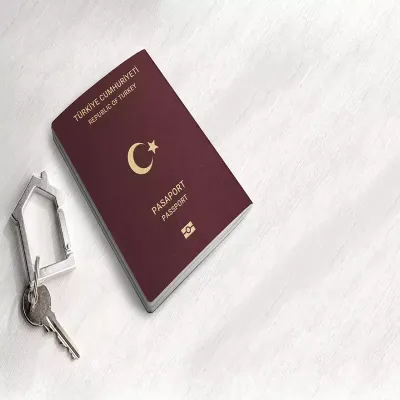Turkey has a unique blend of cultural fusion, natural marvels, and history. Becoming a property owner in Turkey can be a fulfilling experience for American citizens who appreciate being at the intersection of Europe and Asia.
It may be challenging for people to understand the new laws and regulations that they have to follow in Turkey when investing in real estate and residing in the United States.
Worry no more, as we offer you tips and some suggestions in this blog post.
We'll make this material easier to comprehend for you. Please don't hesitate to contact us if you have more queries.
Alternatively, you can download our free Turkey property pack, prepared for your in-depth study by our country specialist and vetted by locals.
Can Americans purchase property in Turkey?
Do I have to be a citizen or permanent resident to purchase real estate in Turkey?
No. You do not need to be a Turkish citizen to buy and own real estate in Turkey.
You can buy real estate in Turkey if you are an American citizen. Moreover, you do not need to be a permanent resident. Still, there are some points that you should keep in mind.
Buying property in Turkey comes with many advantages but unfortunately, it doesn't give you the right to live here indefinitely. If you're going to stay for a relatively long period, you should apply separately for a residence permit. That's quite normal and even easier when you own property.
Furthermore, if your property is worth 400,000 USD or more, you can even apply for the much coveted Turkish citizenship and make this magical country your second home.
To add to this, you can even start the process of buying property in Turkey online from the United States, but you'll eventually need to be present in Turkey or appoint a legal representative here to complete the purchase.
This is for the simple fact that some documents and signatures must be made in person.
Regarding tax ID, yes, you will have to get a Turkish tax identification number. That's another pretty easy thing and something important for any kind of property purchase and many other official and banking procedures.
A local bank account should be opened. Different operations, including paying for the property, transferring money, and paying other expenses in Turkey will be made easier.
You may need a few specifically mentioned documents, for example, a passport and a Turkish tax number for the process.
Which advantages and rights shall the citizens of the US have while purchasing real estate in Turkey?
On the whole, Americans are on par with all the other foreigners not based in Turkey and Turkish nationals who would like to invest in the immovable property of Turkey, but some special rules and constraints apply.
Let's start by discussing location constraints. In some parts of Turkey, property cannot be purchased by foreigners, including Americans.
These are typically rural, military, or security zones where foreign ownership is either entirely forbidden or strictly restricted. This covers certain border regions as well as particular coastal areas. It's crucial to confirm whether the property is located in one of these zones before making a purchase.
No upper limit exists regarding the number of properties that an American may possess in Turkey. But the overall quantity of land you can own is limited.
The overall amount of foreign-owned land in Turkey cannot be more than 10% of the district's total area where the property is situated.
Furthermore, a single foreigner is permitted to possess up to 30 hectares, or roughly 74 acres, of land anywhere in Turkey.
In terms of minimum investment, there isn't a predetermined amount that foreigners must invest to purchase real estate in Turkey.
What if an American decided to purchase land in Turkey?
Let's concentrate a little more on Turkey's land ownership structure.
A U.S. citizen is permitted to buy property in Turkey, though there are some restrictions and regulations about which one should be aware. A citizen of the United States can buy land anywhere in that country.
For example, there are restricted areas. These include areas near the military zone to reservation areas that the government marks as border usage. Boundary areas may also be restricted for environmental reasons or security purposes.
Thus, one should check the local regulations if one prefers an area within the border or along the shore.


















